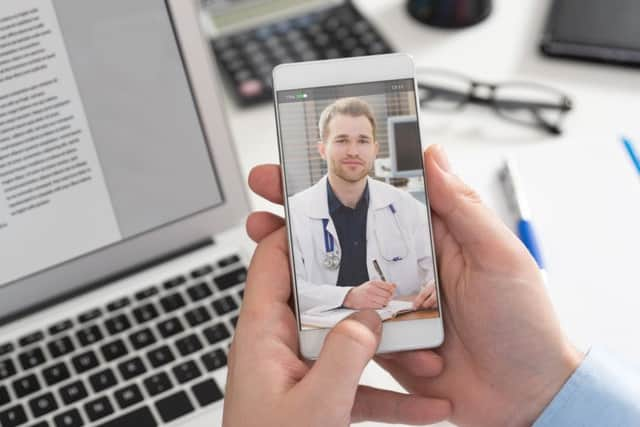‘Skype check-ups’ with GPs could cut demand for face-to-face appointments
A pilot project involving 45 patients and six surgeries in Edinburgh and the Lothians found the technology could be used for those with long-term health problems who require frequent check-ups.
However, doctors said face-to-face visits were most appropriate when delivering bad news or discussing serious health issues.
Advertisement
Hide AdAdvertisement
Hide AdThe research, led by Edinburgh University in collaboration with the universities of Exeter and Warwick, used a Skype-style web-based programme called Attend Anywhere for the consultations.


Patients were sent an email with a link to take them to a “virtual waiting room” at the time of their appointment.
Professor Brian McKinstry, of Edinburgh University’s Usher Institute, said: “Our study showed that there is real potential for video-consulting, particularly for conditions where a visual examination can be helpful. For example, when assessing people who have problems with anxiety and depression and have difficulty getting to their general practice.” The pilot study found patients with jobs were positive about the technology removing the need to travel to and from appointments, while video calls were also liked by younger people.
Doctors reported advantages over telephone consultations as video allows them to pick up on visual cues – such as body language and facial expressions – that can inform an assessment.
Some people with mobility problems or mental health problems found the video consultation to be particularly helpful, the researchers said.
However, technical issues were common, with improvements needed before video consultations can be seamlessly integrated with practice appointment systems.
Dr Andrew Buist, chair of the British Medical Association’s (BMA) Scottish GP committee, said: “While we welcome the use of technology where it can benefit both patient and doctor, video link appointments do not address the point that Scotland needs more GPs to provide the public with the health care they need.
“For the use of such technology to be beneficial to the wider community, it must be ensured that GP surgeries and their patients have access to reliable broadband connections and appropriate hardware.
Advertisement
Hide AdAdvertisement
Hide Ad“It also risks advantaging the affluent who have greater access to computers instead of the community as a whole.
“We must support GP recruitment and retention to ensure that all patients get an appointment best suited to their needs, which is what this paper suggests. Like telephone or email consultations, video appointments are not as flexible as a face to face assessment, but it could be a useful option if well implemented and resourced.”
He added: “The new GP contract is designed to help that process, reduce inappropriate excessive workloads and ensure GPs are able to spend enough time with patients who need them the most.”
The research was funded by the Scottish Government’s Chief Scientist Office.
Information published by NHS England showed more than 2,000 GP appointments were been freed up in Tameside, Greater Manchester by doctors and nurses using Skype to treat older patients.